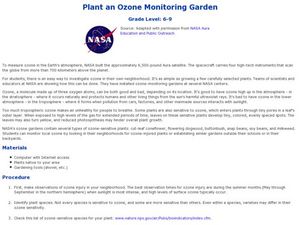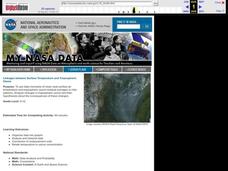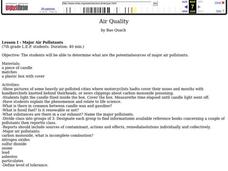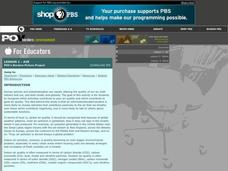Curated OER
Effects of Ozone Depletion
Explore the causes of ozone depletion and the effect on plankton, algae, plants, amphibians, and humans. Learn how the Montreal Protocol has possibly helped reverse the decline of the ozone layer. Warning: photos of skin and eye damage...
Curated OER
Effects of Ozone in the Air
Fifth graders, in groups, conduct an experiment in which they measure ground level ozone levels using an ozone measuring kit. They analyze and compare the weather conditions and locations where ozone readings are highest and lowest.
Curated OER
Ozone: The Earth's Security Blanket
Learners work in groups to define and research the terms: ozone, troposphere and stratosphere. Students watch videos, conduct Internet research, participate in discussion groups and complete worksheets.
Curated OER
Linkages Between Surface Temperature and Tropospheric Ozone
High schoolers use data microsets of mean near-surface air temperature and tropospheric ozone residual averages to infer patterns. Students analyze changes in tropospheric ozone and then hypothesize about the consequences of these changes.
Curated OER
Ground Level Ozone
High schoolers analyze real-time data and predict the level of ground ozone in their home city. They measure the level of ground ozone, submit their data to an online collaborative project, and create a web page presenting the dangers of...
Curated OER
Plant an Ozone Monitoring Garden
Students create a garden. In this ozone instructional activity, students discuss ozone injury, identify plants sensitive to ozone, and then plant their own ozone garden.
Curated OER
Effects of Ozone in the Air
Fifth graders learn how ground-level ozone is an air pollution problem. Students measure ozone levels and graph the results.
Curated OER
Linkages Between Surface Temperature And Tropospheric Ozone
Students collect and interpret data to make predictions about the levels of ozone in the atmosphere. Using the internet to collect data students use their collected data to create a line graph for analysis. Students make mathematical...
Curated OER
Stratospheric Ozone
Pupils explore about the structure of Earth's atmosphere and about the stratospheric ozone. They discuss how it is produced and destroyed, where it is located, why it is important, and how it is changing. Students investigate about the...
Curated OER
Understanding the Ozone Hole PowerPoint Follow Sheet
In this ozone learning exercise, students fill in the blanks to sentences while following a PowerPoint presentation on the ozone layer, its depletion, the causes of the depletion and its structure.
Texas State Energy Conservation Office
Investigation: Blowing in the Wind
Using a simulated air sample, environmental or earth science pupils examine the components. You will need to prepare the faux air by using a hole punch and various colors of construction paper. Each color will represent a different...
Curated OER
Don't oZone Out
Students study the ozone and measure its concentration in different areas. Students use Ecobadge strips and other equipement for measurement. Then they share their results on an on-line forum. Also, students study environmental problems.
Curated OER
Linkages Between Surface Temperature And Tropospheric Ozone
Students organize and analyze data regarding changes in tropospheric ozone and then hypothesize about the consequences of these changes.
Curated OER
Ozone Testing Tools
Young scholars develop an experiment to measure the amounts of ground level ozone present in their area. They collect data, access a related website and compare measurements. They present their findings.
Curated OER
The Breathtaking Nature of the Urban Explosion, Part 2
Learners explore ozone levels. They measure the concentrations of ground-level ozone in the atmosphere. Students observe changes in the concentrations of ozone over time. Learners complete a data sheet to record ozone readings over a...
Curated OER
Create Your Own Investigation
Young scholars design and implement an experiment intended to measure and analyze the air quality of a particular location. They focus on looking for ozone and particulate pollutants.
Curated OER
Air: Air Quality Picture Project
High schoolers recognize which activities contribute to poor air quality and which contribute to good air quality. They discover how air quality is measured, and come up with ways that humans can have a positive affect on air quality.
Curated OER
Air Quality
Students determine potential sources of major air pollutants, explain how acid rain is generated and how it affects the environment, discuss global warming, and explore protective role of ozone and cause of ozone layer thinning. Lessons...
Curated OER
P.O.V.'s Borders Picture Project: Lesson 1 - Air
Take photos of human activities that impact air quality. Collaborative groups present one of the photographs, identifying how the activity contributes to air quality and what can be done to minimize the impact. As one in a series of...
Curated OER
Investigating Seasonal Variability in NO2 Concentrations
Young scholars study different formats of data and determine the nitrogen dioxide concentrations. In this seasons instructional activity students understand the different relationships that NO2 can have.
Teach Engineering
How Effective is Your Sunscreen?
Protect skin from UV radiation! Groups design and conduct an experiment to test the effectiveness of UV safety products. The groups collect the data from the experiment and prepare a lab report. In the second day of the activity,...
Curated OER
CO2 and You
Students study the scientific evidence about carbon dioxide emissions. They learn to calculate the amount of energy used by different appliances. They complete a worksheet which analyzes the amount of energy that their home uses.
Curated OER
Comparing Sunscreens
Twelfth graders use a microcomputer connected to an ultra-violet sensor to compare the relative blocking power of different SPF sunscreens for the UVB region of the solar spectrum.
Curated OER
Transport
Pupils analyze wind barbs and determine which way the wind is blowing and how hard the wind is blowing. They access near real time wind data and pollutant animations to track the transport and destination of pollutants.

























